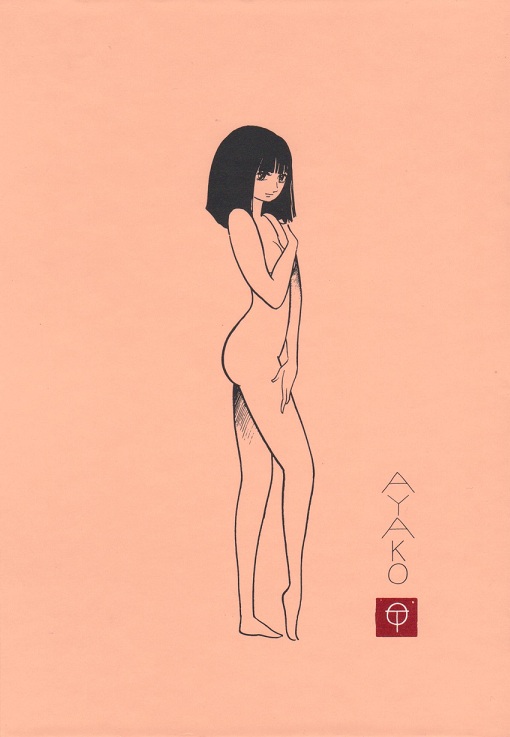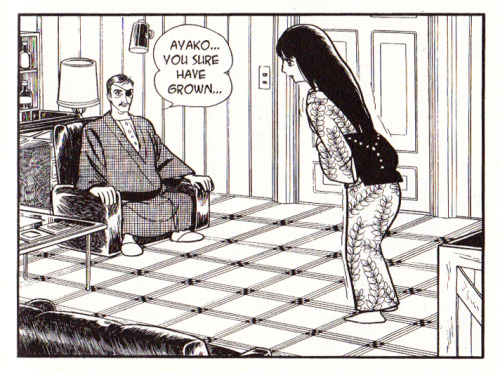The following review was written by Jeff Alford and appeared here: http://contemporarylit.about.com/od/graphicnovels/fr/Ayako-Osamu-Tezuka.htm
I haven't been able to contact him to ask his permission to reprint it, so my apologies for this lapse. I wouldn't have done so had I been able to write a review even half as good of this book.
If you're completely unfamiliar with Tezuka, please read my review of The Art of Osamu Tezuka by Helen McCarthy which is reviewed elsewhere in this blog. He is (or rather, sadly, was) one of the very greatest creators of graphic novels of the 20th century. As a writer/artist he is simply without peer; a creator of graphic stories for children and adults, he possessed a vividly fertile imagination and very strong sense of morality. One of these days, I'll write a proper appreciation of his genius in this this blog.
How long does a war really last, and how does a society become "post-war" after the smoke finally clears? Set in rural Japan, Osamu Tezuka's Ayako follows the deeply troubled Tenge clan as their household (and country) attempts to regain its footing after World War II. Spanning twenty-five years and seven hundred pages, Ayako unfolds like a Victorian novel by way of Alfred Hitchcock: dark family secrets collide with political espionage and create one of the most layered and nuanced graphic novels to ever reach our shores.
The drama in Ayako is pulled between two opposing forces, one of family honor and one of political onus. The end of World War II drew a line between these two themes, and the characters in Ayako struggle to decide which entity's protection is a more honorable cause. The novel begins with Jiro Tenge's return home from the war, who learns very quickly the despicable practices that his family had fallen into during the past five years. Jiro is surprised to see a new child in the Tenge household. Four-year-old Ayako is revealed to be the offspring of Jiro's father and his sister-in-law, a sexual arrangement made by Jiro's brother in an attempt to secure the Tenge inheritance.Jiro's political background is similarly murky, and although the war is over he is still working for the
GHQ, aiding in assassination plots against local leftist party members. After a particularly bloody task of evidence tampering (disposing a corpse on nearby train tracks), Jiro is seen by Ayako and the family maid trying to secretly clean bloodstains from his clothing. Soon after, the Tenge's maid mysteriously drowns. Although Jiro is suspected to be involved in both deaths, the Tenges are more concerned with their family's incest going public with the looming shadow of police investigations. After painful deliberations, it is decided that Jiro flee the village and Ayako be "taken off the books" and permanently sequestered in the building's basement.
Ayako finally escapes after twenty years and journeys to Tokyo in search of Jiro. Due to the absence of any social interaction during her upbringing, Ayako has grown into a relentlessly uninhibited woman and clashes with the social mores of contemporary Japan. Tezuka masterfully presents a country that has evolved faster in twenty years than Ayako herself has matured. Although newly independent, Ayako's existence is so tightly connected to pre-war Japan that she's unable to fit in to a world so desperately trying to move on.
Ayako is an exquisitely composed novel, furiously balanced between the personal and political. However, this may not be one of the rare crossover graphic novels that will pull in new readers from the realm of contemporary literature. Despite the thematic density of the book, the actual dialogue of Ayako at times deflates the mature themes into a gentler, comic-like tone. The members of the Tenge clan all speak in a rural dialect that is often difficult to take with the appropriate gravitas. For instance, during the pivotal meeting that ultimately decided four-year old Ayako's fate:
"As y'all knows, there be a rumor that O-Ryo was killed by somebody. Ayako's actin' scared ‘n hidin' from somebody…she knows somethin' but she be too scared t'talk. Howev'r, whatev'r it be, I betcha it be somethin' dat shall stain the Tenge Clan's name if she were ever t'talk."
Whether this in an issue of Ayako's translation or Tezuka's original intention, Ayako's aural tone will surely have some readers divided. Ayako is so close to being the kind of graphic novel that transcends its intended audience and introduces new readers to the form, but instead will simply remain proudly on the shelves of comics and manga enthusiasts.
"As y'all knows, there be a rumor that O-Ryo was killed by somebody. Ayako's actin' scared ‘n hidin' from somebody…she knows somethin' but she be too scared t'talk. Howev'r, whatev'r it be, I betcha it be somethin' dat shall stain the Tenge Clan's name if she were ever t'talk."
Whether this in an issue of Ayako's translation or Tezuka's original intention, Ayako's aural tone will surely have some readers divided. Ayako is so close to being the kind of graphic novel that transcends its intended audience and introduces new readers to the form, but instead will simply remain proudly on the shelves of comics and manga enthusiasts.




No comments:
Post a Comment